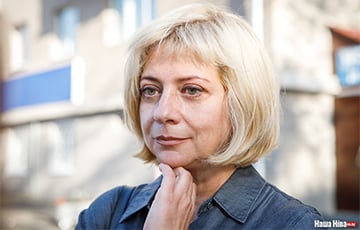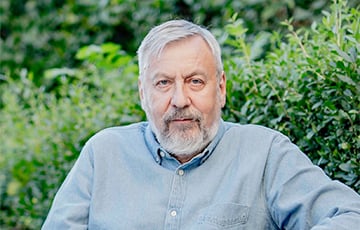Scream At Top Of Your Lungs
51- Iryna Khalip
- 30.08.2024, 19:48
- 44,724

PHOTO: NASHA NIVA
No more curtsies or minuets.
It's hard to breathe when you read the news that a young man who participated in the protests was arrested at the border, where he ended up as a result of deportation. And the deportation happened because Sweden refused to grant him and his mother asylum. And even sent them in handcuffs by plane to Vilnius, from where they were both brought to the border.
I try to imagine the thoughts of these people who are being taken to the border. If you go to a protest, you have two options: get caught or run away. If you run across the border, the options are the same. But if you are deported, denied asylum, there are no more options. You look out the window and desperately memorize the pictures of trees and fields around you, because you don't know how many years will pass before you see them again.
Swedish human rights activist Martin Uggla is outraged that Sweden has granted asylum to only three percent of Belarusians since 2020. Uggla knows the situation in Belarus very well. He was the one who was not allowed into our country since 2006, he was the one who was kept at the Minsk airport and then deported when he tried to get through with a ticket to a match of the 2014 Ice Hockey World Championship, when Belarus opened its borders to everyone who bought tickets. It was his public organization Östgruppen that collected teddy bears for the “Teddy Bears Landing 2.0” (the first landing, by the way, was also carried out by the Swedes in July 2012, when a Swedish plane flew into Belarus, and its pilots dropped almost a thousand teddy bears with posters attached to them saying “We Support the Struggle of the Belarusian People” and “Free Speech Now”). And now Sweden approves three percent of asylum applications. Sasha was three percent, and now the people are three percent?
However, this is not about Sweden. A couple of months ago, I spoke with a completely stunned Minsk resident Vasil after he was denied asylum in Montenegro. Vasil was devastated, it seems, not so much by the fact of the refusal itself, but by the wording. The long and detailed decision of the Montenegrin authorities listed how many international agreements Belarus had signed and how many Ukrainians had received asylum there since the start of the war. A separate paragraph indicated that Belarus signed the Global Compact for Safe, Orderly and Regular Migration in 2019. And that Belarus is participating in the international fight against human trafficking. This means that there is no reason for a Belarusian to ask for protection somewhere else.
Vasil said that the officials who handed him the refusal said: what are you worrying about, buddy, your wife is doing business here, get a residence permit through family reunification and don’t think about the bad. And if an Interpol request comes in for me, Vasil asked, will you extradite me? Of course, we will, his interlocutors happily answered.
And in the spring, I wrote for Novaya Gazeta the story of Aliaksei Velikaselets, who was denied protection by Switzerland. The wording of the State Secretariat for Migration and the Federal Administrative Court was the same: “Although the Belarusian authorities often detain opposition protesters for up to two weeks to curb their militant ardor, this does not apply to the appellant, who has never been arrested”. And the fact that his photographs from the protests appeared in the media, according to officials, cannot pose any threat. “For up to two weeks” is perhaps the most mocking wording possible.
It seems that Belarus is no longer part of Europe. We were torn away from the mainland and carried away somewhere into the ocean. And now we are an island that no one knows anything about. They heard something somewhere, but nothing for sure. It seems like they do arrest someone there, but for the term no longer than two weeks. It seems like human rights are being violated, but not really. And in principle, nothing terrible is happening. Especially since you can sail to that island for three years — you won’t reach it, it’s constantly moving away. And you won’t know what’s really going on there. And who needs to know anyway?
Yes, from time to time people somehow get to dry land from there. They tell nightmare stories about what happened to them and their loved ones. But there are signed international agreements, and there is an official seal of that island. So who knows where these people really come from and what they want.
We are sailing further and further away from civilization, and we don’t have enough strength and voice to scream for help. Ten years ago, when our piece of land had not completely broken away from the mainland, everything was different. Belarusians didn’t have to explain who they were and where they were from; there was no need to prove that innocent people were being thrown into prison; there was no need to present certificates of repression. Now everything has changed. And it is not only the war that is to blame, but also the complete inaction, seasoned with self-admiration, of numerous structures building Lukashenka's vertical in the neighborhood of Belarus. This means that we need to scream in chorus, in unison, at the top of our lungs, so that they can hear. No more curtsies or minuets.
Iryna Khalip, exclusively for Charter97.org











